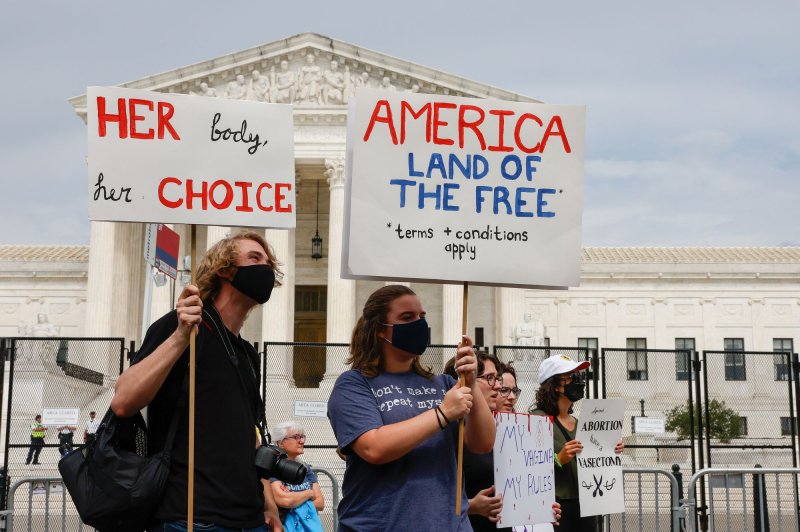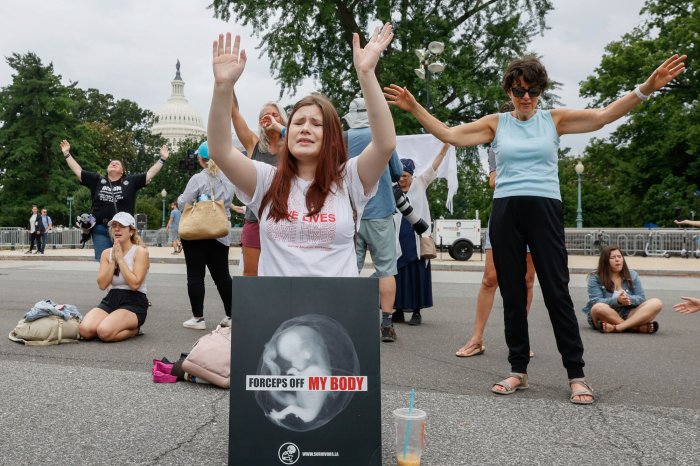Abortion rights advocates hold up signs during a demonstration in front of the U.S. Supreme Court in Washington, D.C., on Monday. On Thursday, judges in Florida and Kentucky imposed temporary injunctions halting the states' abortion trigger laws from going into effect. Photo by Jemal Countess/UPI |
License Photo
June 30 (UPI) -- Judges in Florida and Kentucky have temporarily blocked the states' so-called trigger laws restricting abortion rights one week after the Supreme Court overturned Roe vs. Wade.
The rulings come after similar decisions in Louisiana, Texas and Utah, NBC News reported.
In Florida, Leon County Circuit Judge John Cooper issued a temporary injunction on the state's 15-week abortion ban Thursday after determining it is unconstitutional, WESH-TV in Orlando, Fla., reported. The trigger law was expected to go into effect Friday.
Cooper cited a provision in the state Constitution that gives people freedom from government intrusion in their private life.
"The Florida Supreme Court has determined Florida's privacy provision is clearly implicated in a woman's decision in whether or not to continue her pregnancy," his ruling said.
Planned Parenthood, along with multiple healthcare centers, sued the state to prevent the trigger law from going into effect after the June 24 U.S. Supreme Court ruling overturning federal abortion rights.
"This is not the end -- we likely have a long fight ahead of us," Florida Planned Parenthood Action tweeted.
Planned Parenthood and EMW Women's Surgical Center were behind another lawsuit in Kentucky seeking to halt that state's trigger law banning abortions except to save the life of the pregnant patient or to prevent disabling injury.
There, Jefferson Circuit Court Judge Mitch Perry said Wednesday that he would institute a temporary restraining order to give him more time to consider the case. He scheduled another hearing for next week.
"It's a close call, by the way," he said at the hearing. "In that sense, I want to wrestle with this. I'm going to try to do it later today or first thing tomorrow."
Perry also temporarily blocked the state's 2019 law banning abortions at six weeks of pregnancy, before many people realize they're pregnant, the Courier-Journal in Louisville, Ky., reported.
The lawsuit said Kentucky's abortion law violates the state Constitution's right to self-determination and bodily integrity.
"Despite this victory, we know this fight is far from over -- especially with politicians like Attorney General Daniel Cameron doing everything they can to score political points at the expense of Kentuckians' wellbeing," said a statement from Planned Parenthood and the American Civil Liberties Union.
"We won't stop fighting for people's ability to access the essential abortion care they need in Kentucky. The government should never have the authority to force a person to remain pregnant against their will."
Faith Adams of Bangor, Maine, kneels in prayer at a praise and worship service outside the U.S. Supreme Court in Washington on June 27, days after the court ruled to overturn the Roe vs. Wade abortion case. Photo by Jemal Countess/UPI |
License Photo
















